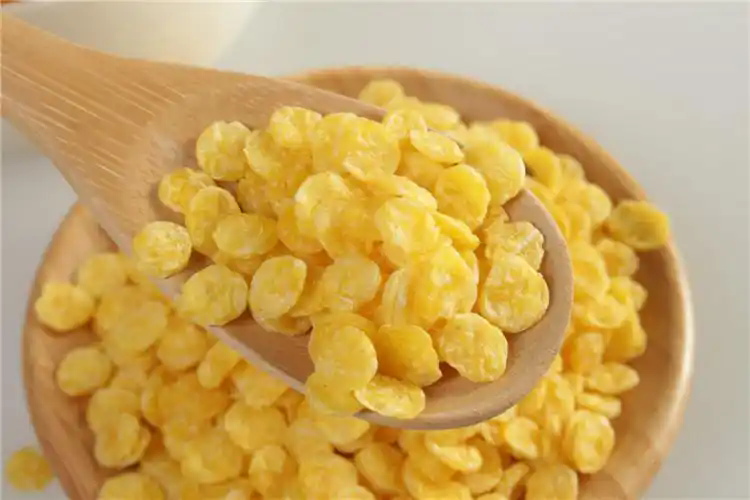
NOTICIAS
Aplicación de líquidos condimentados a base de proteína vegetal hidrolizada en arroz inflado y chips de maíz
2025-01-17
Líquidos condimentos de proteína vegetal hidrolizada han surgido como un ingrediente clave en la producción moderna de snacks, especialmente en el fabricación de arroz inflado y chips de maízEstos líquidos para condimentos se crean descomponiendo las proteínas vegetales en péptidos y aminoácidos más pequeños, lo que mejora su digestibilidad, solubilidad y perfil de sabor. En la producción de bocadillos como arroz inflado y chips de maíz, estos líquidos para condimentos se utilizan para mejorar el sabor, la textura y el contenido nutricional. Este artículo explora el papel de los líquidos para condimentos de proteína vegetal hidrolizada en la tratamiento, producción, y fabricación de estos bocadillos populares, destacando sus beneficios y diversas aplicaciones.
1. Introducción a la proteína vegetal hidrolizada
La proteína vegetal hidrolizada se deriva de fuentes vegetales como: soja, guisantes, maíz, y arroz. A través de un proceso llamado hidrólisisLas proteínas se descomponen en cadenas más pequeñas, llamadas péptidos, lo que las hace más fáciles de digerir y absorber. Estos péptidos más pequeños también proporcionan un sabor concentrado y sabroso. umami sabor, que realza el sabor general de la comida.
Las proteínas vegetales hidrolizadas no solo son conocidas por sus propiedades para mejorar el sabor, sino también por su capacidad para mejorar el sabor. perfil nutricional de alimentos. Son una fuente rica de aminoácidos esenciales y se utilizan normalmente en productos de origen vegetal o vegetariano Opciones de snacks como fuente de proteínas.
2. Beneficios de los condimentos líquidos a base de proteína vegetal hidrolizada
Incorporación de líquidos condimentos de proteína vegetal hidrolizada en arroz inflado y Chip de maíz Los productos ofrecen múltiples ventajas, incluida una mejor sabor, textura, y nutricional Contenido. Algunos de los beneficios clave incluyen:
Mejora del sabor:
El beneficio más significativo de los líquidos condimentos de proteína vegetal hidrolizada es su capacidad para realzar el saborLa hidrólisis libera aminoácidos libres que contribuyen a la umami El sabor es una nota clave en los productos salados. La adición de líquidos de condimentos de proteína vegetal hidrolizada al arroz inflado y a los chips de maíz puede crear una experiencia de consumo más satisfactoria y sabrosa, con un sabor más rico en comparación con los métodos de condimento tradicionales.
Textura y sensación en boca mejoradas:
Otra ventaja es la capacidad de mejorar la textura y sensación en boca de los snacks. Las proteínas hidrolizadas pueden crear una sensación suave y cremosa que mejora la experiencia general del snack. Esto es particularmente importante en el caso del arroz inflado y los chips de maíz, ya que el condimento debe absorberse fácilmente y distribuirse de manera uniforme en los snacks. La proteína ayuda a mejorar la adherencia del recubrimiento, lo que brinda una textura uniforme y crocantez.
Refuerzo nutricional:
En el fabricación En el ámbito de los snacks, existe una demanda creciente de opciones más saludables y nutritivas. Proteínas vegetales hidrolizadas son una excelente fuente de proteína de origen vegetal y contienen aminoácidos esenciales, lo que los convierte en una excelente alternativa a las proteínas de origen animal. Al agregar estas proteínas al arroz inflado y a los chips de maíz, los fabricantes pueden ofrecer un producto que no solo tiene buen sabor, sino que también favorece una dieta equilibrada, en particular para vegetarianos y veganos.
Opciones libres de alérgenos:
A muchos consumidores les preocupan cada vez más las alergias alimentarias, en particular a ingredientes como los lácteos y el gluten. La proteína vegetal hidrolizada puede derivarse de fuentes no alergénicas, como guisante o arroz proteína, lo que la convierte en un ingrediente seguro y accesible para un público más amplio, incluidas aquellas personas con sensibilidad a los alérgenos comunes.
3. Aplicaciones en la producción de arroz inflado y chips de maíz
Los líquidos condimentos de proteína vegetal hidrolizada se utilizan en varias etapas de producción y tratamiento Para mejorar tanto el sabor como el contenido nutricional del arroz inflado y los chips de maíz. A continuación, se indican algunas aplicaciones clave:
Recubrimiento de condimento para arroz inflado:
En la producción de arroz infladoEl condimento se aplica normalmente después de que el arroz se haya inflado. Los líquidos de condimentos con proteína vegetal hidrolizada son una opción ideal para este paso, ya que se pueden rociar o mezclar uniformemente sobre la superficie del arroz inflado. Estos líquidos de condimento garantizan que cada pieza esté cubierta con un sabor rico y sabroso, lo que contribuye al perfil de sabor general del producto. Las proteínas del condimento ayudan a unir el sabor al arroz inflado, mejorando su textura y consistencia.
Saborizante para chips de maíz:
Para chips de maízEl proceso de condimentación comienza después de que se le da forma a la masa de maíz y se fríe u hornea. Se agregan líquidos de condimentación de proteína vegetal hidrolizada a la superficie de las papas fritas para realzar su sabor. El líquido de proteína se adhiere a las papas fritas durante el proceso de fritura, lo que proporciona una capa uniforme que brinda una textura satisfactoria y rico en umami El gusto. sabroso El perfil de sabor creado por la proteína hidrolizada puede hacer que los chips de maíz sean más atractivos para los consumidores, especialmente para aquellos que disfrutan de alternativas de bocadillos a base de plantas.
Barras nutricionales y snacks envasados:
Además del arroz inflado y los chips de maíz, los líquidos condimentos de proteína vegetal hidrolizada también se utilizan en el desarrollo de barras nutricionales y otros productos envasados para picar. Estos productos requieren un equilibrio entre sabor y contenido proteico, que las proteínas hidrolizadas ayudan a lograr. Los líquidos de condimento se mezclan en barras o snacks para aumentar el contenido proteico y crear un sabor salado o dulce, según el producto específico.
4. Consideraciones sobre fabricación y procesamiento
La incorporación de líquidos condimentos de proteína vegetal hidrolizada en arroz inflado y Chip de maíz La producción requiere cuidado fabricación Procesos para garantizar que el producto final cumpla con las especificaciones deseadas de sabor, textura y nutrición. A continuación, se presentan algunas consideraciones clave de fabricación:
Aplicación uniforme del condimento:
Uno de los desafíos en el uso de líquidos de condimentos de proteína vegetal hidrolizada es garantizar que el condimento se aplique de manera uniforme a cada pieza de arroz inflado o chip de maíz. Para lograr una cobertura uniforme, el líquido de condimento generalmente se rocía sobre los bocadillos durante o después de la cocción. resoplando y fritura procesos. Esto requiere equipos de precisión, como Pulverizadores o máquinas de recubrimiento, para garantizar la consistencia en cada lote de bocadillos.
Estabilidad y vida útil:
Otra consideración importante es la estabilidad del condimento de proteína vegetal hidrolizada a lo largo del tiempo. Como con cualquier condimento liquidoLos fabricantes deben asegurarse de que el condimento no pierda su sabor ni su contenido nutricional durante la vida útil del producto. Esto se puede lograr mediante un uso adecuado almacenamiento y envasado para mantener la integridad del condimento.
Costo y abastecimiento:
El costo de incorporar proteína vegetal hidrolizada a los snacks es otro factor que los fabricantes deben tener en cuenta. Si bien las proteínas vegetales hidrolizadas ofrecen muchos beneficios en términos de sabor y nutrición, pueden ser más caras que los condimentos tradicionales como la sal o el glutamato monosódico. Los fabricantes deben sopesar los beneficios de la proteína vegetal frente al costo adicional, especialmente en un mercado de snacks altamente competitivo.
5. Tendencias del mercado y demanda del consumidor
El ascenso de dietas basadas en plantas y alimentación consciente de la salud ha tenido un impacto significativo en la industria de los snacks. Los consumidores buscan cada vez más saludable, sostenible, y nutritivo opciones de snacks, y los fabricantes están respondiendo incorporando más ingredientes de origen vegetal en sus productos. Líquidos condimentos de proteína vegetal hidrolizada son una solución ideal, ya que satisfacen estas demandas de los consumidores. etiqueta limpia, alto en proteínas, y vegetariano Aperitivos.
Tabla 1: Comparación de proteína vegetal hidrolizada vs. condimento tradicional
| Aspecto | Condimento de proteína vegetal hidrolizada | Condimentos tradicionales (por ejemplo, sal, glutamato monosódico) |
|---|---|---|
| Contenido de proteína | Alto contenido en proteínas de origen vegetal | Ninguno |
| Perfil de sabor | Umami, sabroso, rico | Salado, a base de glutamato monosódico |
| Libre de alérgenos | Puede estar libre de alérgenos (dependiendo de la fuente) | Puede contener alérgenos como lácteos o gluten. |
| Valor nutricional | Alto contenido en aminoácidos esenciales | Bajo en valor nutricional |
| Sostenibilidad | De origen vegetal, más ecológico | Ingredientes sintéticos o de origen animal |
6. Conclusión
El uso de Líquidos condimentos de proteína vegetal hidrolizada en arroz inflado y chips de maíz ofrece numerosos beneficios, entre ellos, un sabor mejorado, una textura mejorada y un mayor contenido nutricional. A medida que las preferencias de los consumidores se orientan hacia opciones de snacks más saludables y de origen vegetal, estos líquidos aderezos proporcionan una solución versátil y funcional para satisfacer la creciente demanda de snacks de etiqueta limpia, ricos en proteínas y sostenibles. Al aprovechar el poder de las proteínas vegetales hidrolizadas, los fabricantes pueden crear productos de snacks innovadores que sean deliciosos y nutritivos, a la vez que se alinean con las tendencias cambiantes en la industria de los snacks.


